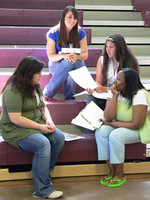Canutillo students get head-start on economic literacy
November 28, 2008
State Senator Eliot Shapleigh introduced three bills this month that promote the education of financial literacy. Ideally, Senator Shapleigh would like to implement a state-wide Kthrough-12 financial literacy program by 2013.
Written by Marissa Monroy, KVIA.com

EL PASO -- They may know how to use a credit card at the mall, but beyond that, most high school students don't know much about finances.
That's just one reason why State Senator Eliot Shapleigh introduced three bills this month that promote the education of financial literacy.
Ideally, Senator Shapleigh would like to implement a state-wide Kthrough-12 financial literacy program by 2013.
But students at one local high school are already getting a jumpstart on savvy saving and spending.
Don't be alarmed if you see Canutillo High School students counting your money, cashing a paycheck, or approving a loan. They're certified student tellers at the GECU credit union inside their high school.
"I know how to withdraw money and know how to the CD rates work," said student teller Victor Parra. "I know about credit cards, debit cards, loans, paying your credit card and the interest you're gonna get."
Experts said these are tasks some adults even struggle with.
Senator Eliot Shapleigh is hoping to make it mandatory for students to get schooled on finances. Currently, the course is only an elective.
Shapleigh is banking on the idea that teaching teens financially responsibility now will pay off later, even for younger students.
A Canutillo teacher believes classroom credit unions are an economic win for everyone. "Especially with our economy, who knows what's going to happen later. I think it would be very beneficial for every student to take a class like that," said Tim Barno.
"It's pretty important for everyone when you get older finances are a big part of everyone's life," said Jesse Hernandez, a student in the program.
![]()
![]()
Related Stories
![]()
Fair Use Notice
This site contains copyrighted material the use of which has not always been specifically authorized by the copyright owner. We are making such material available in our efforts to advance understanding of environmental, political, human rights, economic, democracy, scientific, and social justice issues, etc. We believe this constitutes a "fair use" of any such copyrighted material as provided for in section 107 of the US Copyright Law. In accordance with Title 17 U.S.C. Section 107, the material on this site is distributed without profit to those who have expressed a prior interest in receiving the included information for research and educational purposes. For more information go to: http://www.law.cornell.edu/uscode/17/107.shtml. If you wish to use copyrighted material from this site for purposes of your own that go beyond "fair use", you must obtain permission from the copyright owner.